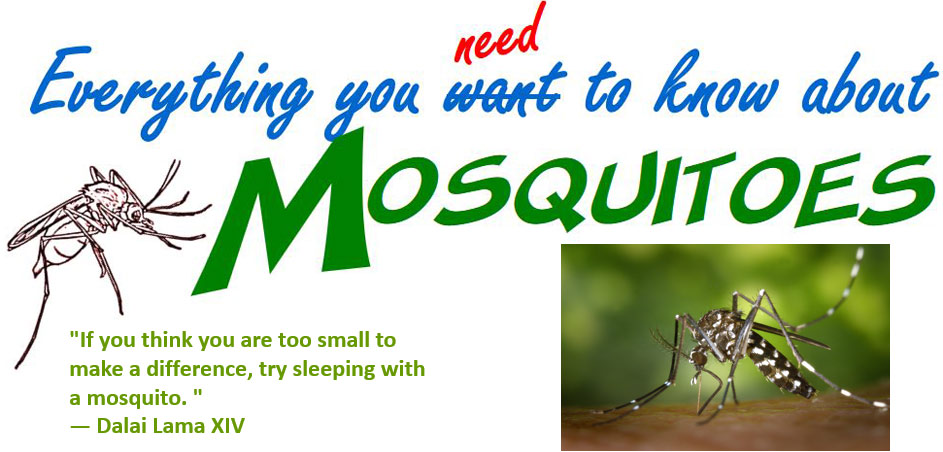 |

The Mosquito
- Diet: Blood
- Family: Culicidae
- Number of species: 3,500
- Average life span in the wild: 2 weeks to 6 months
- Size: 1/8 to 3/4 in (0.3 to 2 cm)
- Group name: Swarm
- Natural predators: Bats, Birds, Fish, Frogs and Tadpoles, Turtles, Dragonflies, Damselflies, Aquatic Beetles, Spiders
It has become evident to the staff and to people around the world who use our health training programs that many of WiREDís modules relate to diseases spread by mosquitoes. The most recent and conspicuous example is Zika, but, well before that, we had addressed dengue; yellow fever; the tongue-twister, chikungunya; and we can't forget the most widespread and deadly mosquito-borne disease: malaria.
In response, WiREDís staff has created a Webpage that brings together a variety of facts, statistics and practical approaches to dealing with mosquitoes in order to minimize the likelihood of being bitten and to employ remedies after a bite. Weíll also link to our detailed educational programs that teach about illnesses that could be contracted from a mosquito bite. People are sometimes amused by the mischief of these pesky creatures, but we should never be fooled into thinking they are only an annoyance. For millions of people, the mosquito is an instrument of death.
Thanks to the following researchers, writers and editors for their contribution to this Webpage:
Bernice Born, Betty Fine, Allison Kozicharow, Matt Lang, Ann Mangold.
Mosquito Facts
Q: How long have mosquitos existed?
A: Mosquitoes have existed since the Triassic Period — 400 million years ago. They were in North America from the Cretaceous Period — 100 million years ago.
Q: How much does a mosquito weigh?
A: The average mosquito weighs about 2.5 milligrams.
Q: How much blood does a mosquito drink?
A: The average mosquito takes in about 5-millionths of a liter of blood during feeding.
Q: How do mosquitos find their prey?
A: Mosquitoes find hosts by observing movement; by detecting infra-red radiation emitted by warm bodies; and by receiving chemical signals from them. Mosquitoes are attracted to carbon dioxide and lactic acid, among other chemicals, at distances of 25 to 35 meters.
Q: How fast do mosquitos fly?
A: Mosquitoes fly at an estimated speed of 1 to 1.5 miles per hour.
Q: Which people are most attractive to mosquitos?
A: Large people are often more attractive to mosquitoes because they are bigger targets, and they produce more mosquito attractants, namely CO2 and lactic acid.
Q: Who else is attractive to mosquitos?
A: Active or fidgety people also produce more CO2 and lactic acid.
Q: What smells do mosquitos like?
A: Smelly feet are attractive to certain species of mosquitoes — as is Limburger cheese.
Q: Is there any clothing that is better for hiding from mosquitos?
A: Dark clothing has been shown to attract some species of mosquitoes more than light colored clothing.
Q: What else is attractive to mosquitos?
A: Movement increased mosquito biting up to 50% in some research tests.
Q: Do mosquitos prefer a full moon?
A: A full moon increased mosquito activity 500% in one study.
Source: American Mosquito Control Association
Zika Virus — Did You Know?
Q: How is Zika spread?
A: Zika is spread mostly by the bite of an infected Aedes aegypti and albopictus mosquito. These mosquitoes are aggressive daytime biters. They can also bite at night.
Q: Is there a vaccine for Zika?
A: There is no vaccine or medicine for Zika.
Q: What is the connection between Zika and Pregnancy?
A: Zika can be passed from a pregnant woman to her fetus. Infection during pregnancy can cause certain birth defects such as microcephaly.
Q: How else can Zika be spread?
A: Zika can also be spread by sexual contact.
Q: Is it safe to travel to areas where Zika is active?
A: Pregnant women should not travel to areas with Zika.
Q: Can travelers spread Zika?
A: Returning travelers infected with Zika can spread the virus through mosquito bites.
Q: Do mosquitos spread other diseases besides Zika?
A: Mosquitoes that spread Zika also spread dengue and chikungunya viruses.

|
Sources
|
List of WiRED Modules Related to Mosquitoes
|

|



